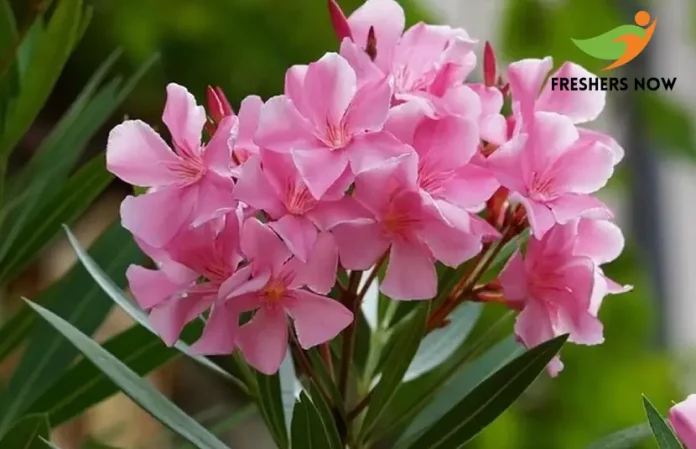
Kerala Temples Ban Oleander After Woman’s Death: In response to the tragic death of Surya Surendran, a 24-year-old woman who accidentally consumed oleander leaves, major religious temple boards in Kerala have taken swift action. The Travancore Devaswom Board and the Malabar Devaswom Board have imposed a ban on the use of oleander flowers in temple offerings. This proactive measure aims to prevent future incidents of poisoning and ensure the safety of devotees.
Understanding Oleander: Toxicity and Risks
Oleander, known locally as Arali in Kerala, is a highly toxic plant widely cultivated for its ornamental beauty. All parts of the plant, including oleander leaves, stems, flowers, and roots, contain potent cardiac glycosides, posing a severe risk of poisoning. Symptoms of oleander toxicity range from nausea and vomiting to irregular heart rate and, in severe cases, death. Despite its danger, oleander remains popular for its attractive flowers and drought resistance.
The Dual Nature of Oleander in Traditional Medicine
Historically, parts of the oleander plant have been used in Ayurveda for treating various ailments, particularly skin conditions. However, medical experts caution against its unchecked use due to its narrow therapeutic window and high toxicity. The recent tragedy underscores the importance of increased public awareness regarding oleander’s lethal potential.
Safety Measures and Immediate Actions
In the event of oleander ingestion, immediate actions are crucial. It is advised to rinse the mouth to remove any plant residue and consume ample fluids to aid detoxification. Hospital admission may be necessary to manage symptoms, which can persist for several days. Timely medical intervention is vital for recovery, although severe cases can be fatal.
About Ayurvedic Pharmacopoeia of India
The Ayurvedic Pharmacopoeia of India (API) is a government-issued document that sets standards for Ayurvedic drugs and substances. It ensures the quality, purity, and strength of ingredients used in Ayurvedic medicine, promoting safety and efficacy. The API serves as a benchmark for practitioners, researchers, and manufacturers, detailing preparation methods and dosages for various compounds.
Ban on Oleander Usage in Temples
Following the recent incident, the Travancore Devaswom Board and the Malabar Devaswom Board have banned the use of oleander flowers in temple offerings and prasadam. Instead, devotees are encouraged to offer tulsi leaves, thechi (Jungle geranium), and hibiscus. While oleander flowers may still be used for pujas, precautions are taken to ensure they do not reach the hands of devotees.
Understanding the Tragedy
The ban comes after a woman in the Alappuzha district died from suspected poisoning due to accidental oleander leaf consumption. Surya Surendran, a nurse bound for the UK, vomited and collapsed at the Cochin International Airport before passing away at a private hospital. Postmortem reports indicated the presence of toxic substances in her blood, likely from the oleander leaves she inadvertently consumed.
Conclusion
The tragic death of Surya Surendran underscores the need for stringent measures to protect devotees from the dangers of poisoning oleander leaves. The ban on oleander flowers in temple offerings reflects a proactive step by Kerala temple boards to ensure the safety and well-being of worshippers. Increased awareness, along with strict adherence to safety protocols, is essential in preventing similar incidents in the future.
Stay updated with the latest current affairs and insightful blog posts by following Freshersnow. Don’t miss out on future content that keeps you informed and engaged!
| You Can Also Check | |
| Current Affairs | |



